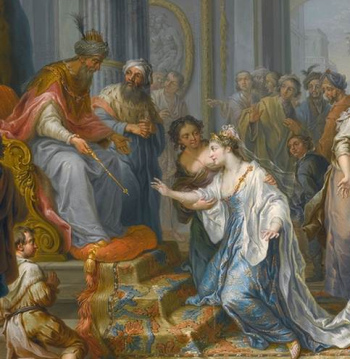Conquering the Medes in 549 B.C. and the Babylonians in 539, the Persian (Medo-Persian) empire is considered the most powerful of the ancient empires.
[Map of Persia's Empire at its Peak]
At its peak, just before the time of Esther who lived during the reign of Xeres I the Great (Ahasuerus), the empire controlled more than 2.9 million square miles (7.5 million square kilometers) of land. Its massive territory spanned three continents (Asia, Africa and Europe).
The Persian Empire of Esther's day lasted until the cities of Susa (Shushan) and Persepolis surrendered to Alexander the Great in 330 B.C.
No God
The books of Esther and the Song of Solomon are the only two books in the Old Testament (and the whole bible) that do not mention God.
Biblical Prophecy
The Medo-Persian empire of Esther' day is represented in Bible prophecy by the chest and arms of silver in Nebuchadnezzar's well known prophetic-related vision of a man (Daniel 2:32, 39). This second great world empire, which followed Babylon's rise to power, was also symbolized by a bear (Daniel 7:5) and a ram with two horns, which represented both Media and Persia.

Then I lifted up my eyes, and looked. And behold, a ram stood before the river having two horns, and the two horns were high, but one was higher than the other, and the higher one came up last.
I saw the ram pushing westward and northward and southward, and no beast could stand before him, nor any that could deliver out of his hand. But he did according to his will and became great . . .
The ram which you saw having two horns are the kings of Media and Persia (Daniel 8:3 - 4, 20, HBFV).
The Persian Empire plays a prominent role in a few Old Testament books. Although found only once in the books of Daniel and Ezra, King Ahasuerus appears twenty-eight times in the book of Esther.
The Longest Verse!
Coming in at 90 words and 528 characters, Esther 8:9 in the King James Bible is the longest single verse in the Old Testament.
Then were the king's scribes called at that time in the third month, that is, the month Sivan, on the three and twentieth day thereof;and it was written according to all that Mordecai commanded unto the Jews, and to the lieutenants, and the deputies and rulers of the provinces which are from India unto Ethiopia,
an hundred twenty and seven provinces, unto every province according to the writing thereof, and unto every people after their language, and to the Jews according to their writing, and according to their language (Esther 8:9, KJV).
[Where Does India Appear in Scripture?]
The King James word "Ethiopia" is derived from a Hebrew word which means "black" (Strong's #H3568, #G128). The word "India," which appears only twice in Scripture, means "flee away" or "give ye thanks" (#H4480, #H1912).
Weird Name
King Ahasuerus is one of the major characters in the book of Esther. His name means, "I will be silent and poor" (Strong's #H325 in Brown-Driver-Briggs Hebrew Definitions). Ahasuerus was anything but poor or silent, as he solely ruled the most powerful empire in the ancient world!
Contrasts
Esther was a Jewess who lived among and married a Gentile. In contrast, Ruth was a Gentile (a Moabitess) who lived among and eventually married a Jew (Boaz).